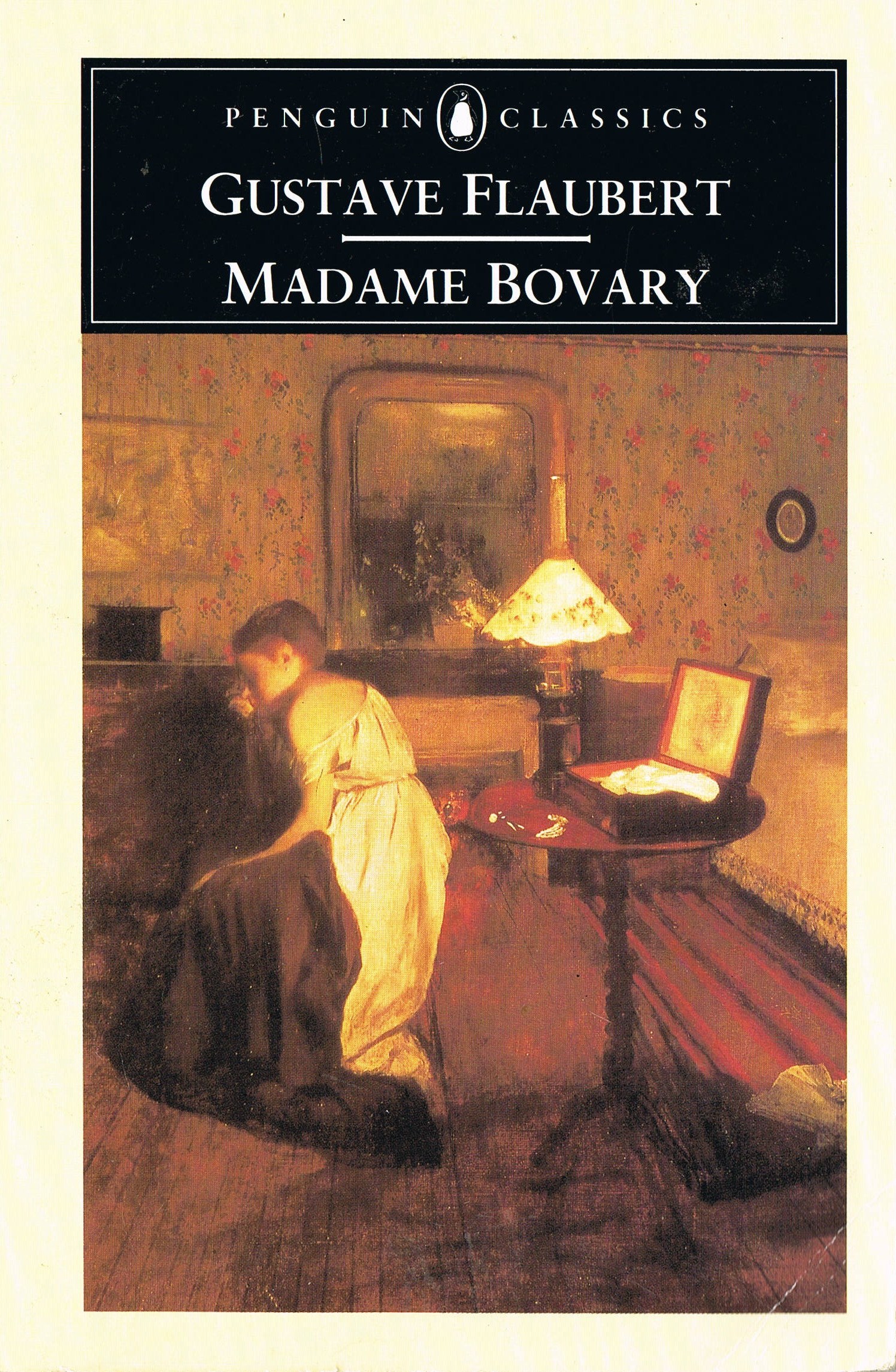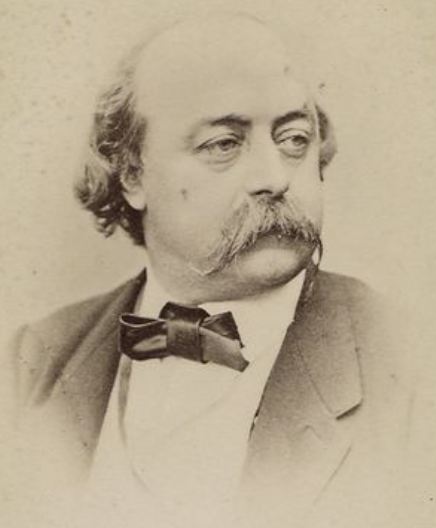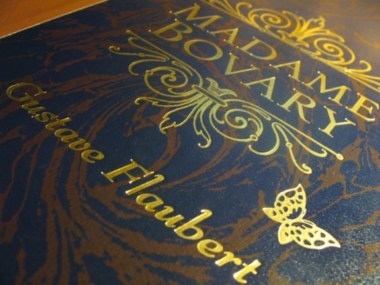MyFrenchLife™ French Book Club: Gustave Flaubert, Madame Bovary – March 2018
Calling all Francophiles, lovers of literature, and savvy challenge seekers. Have you ever dreamt of joining a French book club? Well, now’s your chance… Welcome to the MyFrenchLife™ 12-month French Literature Challenge 2018!
Every month this year, we challenge you to sit back, relax, and delve into one of in our specially chosen French books! In March, we’re reading Gustave Flaubert.
Why take part in the MyFrenchLife™ book club?
Each month, we’ll be consulting our French literature experts to bring you a new and exciting French book review. We promise to dig deep and share our most intimate opinions, interpretations, and perceptions of France’s best literary offerings – and we’d love you to do the same!
Perhaps you can’t resist a challenge.
Maybe you’re still looking for that perfect New Year’s resolution.
Whatever your reason, we challenge you to join us in our 2018 literary crusade – every opinion matters, especially yours.
This March, we’re continuing the challenge with one of our all-time favourite literary classics – Gustave Flaubert’s ‘Madame Bovary’.
So, let’s all pick up our books and let the reading commence! Join our online book club, join the reading, join the fun – and have your voice heard.
Gustave Flaubert’s ‘Madame Bovary’Buy here: en français & English – dual language book
Buy here: en français
Gustave Flaubert: a literary masterpiece
 Madame Bovary is Gustave Flaubert’s notorious novel based on the unfortunate life of Doctor Charles Bovary’s wife, poor Emma Bovary.
Madame Bovary is Gustave Flaubert’s notorious novel based on the unfortunate life of Doctor Charles Bovary’s wife, poor Emma Bovary.
Flaubert’s power to project the feelings of a female heroine, in the oppressive setting of nineteenth-century French bourgeois society, allows his novel to be elevated to one of the most well-known classics in French literature.
The novel begins as an almost stereotypical romance story. Doctor Charles Bovary, married to a tyrannical, jealous woman, Heloise Dubuc, meets Emma and falls head over heels for her.
After the sudden death of his first wife, Charles is free to rescue Emma from the boredom of her father’s farm and marry her – Emma Bovary’s dream.
Yet, this is not happy-ever-after, this is Gustave Flaubert.
Love and expectations: a doomed heroine
Emma quickly realises that marriage is not what she expected.
Charles cannot compare to her many romantic novels, with their spectacular heroes and heroines. Instead, Emma sees him as emotionless, flat, and boring.
She resorts to trying to find her happiness elsewhere, through the means of luxury items – and even in other men. Two affairs with two different men, Léon and Rodolphe, allow Emma to finally feel what she sees as “true romance”.
Yet, these quickly become an enormous disillusion for the young woman.
Readers will quickly realise that Emma is never happy with what she has; nothing will ever match her large expectations of life.
Her fate, like all of Flaubert’s heroines, is doomed.
Gustave Flaubert: the blame game
Gustave Flaubert makes readers question who is to blame for this doomed fate of Emma Bovary.
- Is it the fault of the patriarchy she lives in, forcing her to marry, to stay at home, to live a non-adventurous life?
- Is it the fault of the men who ‘pretend’ to love her, to simply use her for their own personal gains?
- Or is it Emma’s own doing?
- Was it the need to live a fulfilling, bourgeoisie lifestyle?
Whatever our opinions may be of Emma’s fate, what is certain is Flaubert’s disdain towards society.
Throughout his novel, he nourishes a hatred for the stagnant society of the nineteenth-century bourgeoisie, which provides a backdrop for his characters.
Emma, of course, represents a comment on the married women of nineteenth-century France – a doomed heroine with only one means of escape…
Emma Bovary: modern-day life lessons

Obsessed by the need to purchase everything she desires and achieve the perfect life, Emma could teach many of us readers life lessons.
I have read Madame Bovary (currently) five times, and each time I find something new and exciting.
The text itself is a piece of artwork; with Flaubert’s faultless style, his beautiful descriptions, the important use of object symbolism, flawless characterisation, and of course – his use of free indirect speech.
For me, Gustave Flaubert is THE French author to read when wanting to read in French. Not only will you be reading one of the most influential written styles, but you will discover the drama, characters and incredible plot of a true French classic.
Madame Bovary is, and always will be, the French classic of its time.
Now it’s your turn – get involved here.
Let the challenge begin!
Here you will find full details of our 2018 French literature challenge and READING LIST
In true book club fashion, we’re eager to get together – if only virtually – and compare literary notes. Leave your reviews in the comments box and complete the questions in the reading guidance form linked below.
Did you enjoy Gustave Flaubert’s ‘Madame Bovary? Who do you think is responsible for Emma’s doomed fate? We’d love to hear your thoughts and reflections in the comments box below – here’s where you GET INVOLVED.
Image credits
1. © Jessica Rushton
2. Penguin Classics Madame Bovary, via Flickr
3. Gustave Flaubert, via Wikipedia
4. Madame Bovary, by Robert Burdock via Flickr








I’m about halfway through the book and find Emma a surprisingly unsympathetic character.
I take your point that she’s forced to stay at home and live an unadventurous life. Women of her day had few options (though interestingly, Flaubert only makes this point once, in a single paragraph.) So it wasn’t as if she has a lot of choices.
Having said that, she wasn’t forced to marry Charles. And Charles never misrepresented what he was–a simple, unsophisticated country doctor. He’s the one I feel bad for, because he adores Emma and tries to do what’s best for her, even giving up his practice and moving to a new town in search of curing what mysteriously ails her. And she is remarkably unappreciative of the guy.
I agree that Emma’s novel reading, to the exclusion of focusing on real life, is much like looking wistfully at the curated lives of friends on Facebook and Instagram and wishing you had the same (not realizing that it’s a facade.)
What I mostly want to do when reading this book is take both Charles and Emma, shake them by the shoulders and say, “Would you two please just talk to each other, really talk?” They seem never to have connected, and maybe not to have tried. Calling the marriage counselor, stat!
I’ll say that the scene where Rodolphe (the cad) begins his seduction of Emma, during the agricultural fair, is brilliantly written. The way the writing goes back and forth between the emotional, romantic language of Rodolphe and the prosaic language of the fair’s speakers (“and let’s not forget the flax farmers!”) is outstanding.
More comments when I finish the book…
Dear Keith, Thank you so much for becoming so involved in the book club. It is great to see you’re halfway through Bovary, it’s a long novel! I hope you’re enjoying it.
So glad you share my opinion about Emma – she is very difficult to love at times. I think it really shows that no one wins when it comes to the hypocrisy of nineteenth century marriage!
I’m really glad you also spotted the real break down they have in communication! A lot of critics have analysed this in the way they cannot find the words to speak to each other and have a struggle to really articulate their inner thoughts! (It’s actually a reoccurring theme in say Salammbô too!) Maybe Flaubert is trying to tell us something about the way humans truly communicate!
Rodolphe is an interesting character, yet I think I still prefer him to Léon! He’s a bit more interesting, sleazy and I think personally it’s him that Emma truly fell for!
I would love to know what you think of the shocking ending! Cannot wait to discuss things further with you!
Jess
Dear Keith,
In a recent comment below I questioned the idea of the male author and now I would love to see your thoughts on the matter! Do you think that Flaubert being a male author has hindered the representation of Emma in any way? Do you think he accurately portrays the thought and feelings of a woman?
Can’t wait to continue our discussion!
Jessica
Hi Jess,
Hm, it’s hard for me to say if Flaubert has accurately portrayed Emma as a woman, given that I’m a man. It’s even harder because she’s a character in 19th century rural France, a world much different from my own.
Having said that, I will say that I think Emma is an extreme character more than a real person. I doubt that many 19th century French women, rural or urban, were very much like her. She strikes me in many ways as a young adolescent who never grows up.
Like many of us at the age of 13 or so (ok, I’ll admit it) she is extremely self-centered, has only naive notions of love, and blames every problem on somebody else. However, unlike most of us, Emma never develops beyond that point, despite years of contact with real life, a marriage, a child, etc. She’s like a perpetual cranky adolescent, making her an interesting literary character but not very realistic as a person.
Keith
p.s. I’m only through Part 2 so my opinion could change based on what is still to come.
Hi Keith!
I completely understand, but I’m glad it’s not as clear cut as simply “This is clearly a man writing about a woman with no idea”. I think that is what makes it such a special book.
I love your analogy here! I don’t think Emma is actually too old by the sense I gain of the first part of the book…but yes, she really does lack experience of real life, forcing her to maybe appear, as you say, like an adolescent. I think the extremities are what I like best, however. To think how oppressed women were in the 19th century, it would be interesting to imagine they had such crazy thoughts! (No spoilers for the second part however!)
Cannot wait for you to read the second half – it gets a little crazy soon!
Jess
Hi Jess,
I’ve finished the book and I agree it gets crazy!
I’ve changed my opinion of Emma. At first I thought she was a bit like a teen who never grew up and maybe was a victim of circumstance. But now I see her as one of the most selfish and self-centered characters I’ve encountered in literature.
The turning point for me came after she spent the day with Léon and melodramatically told him all about how much she “suffered.” That night she comes home and finds her husband actually suffering over the death of his father, a terrible blow as those of us who have lost a parent can attest. Her reaction, “Geez this is boring. I can’t wait to see Léon again.”
Emma is someone without empathy. She doesn’t even seem to care much about Berthe. And her relations with Léon and Rodolpho are more grounded in fantasy than reality.
In the end, even knowing that she has ruined the lives of her husband and daughter, she refuses to accept responsibility and takes the coward’s way out.
Hm, can you tell that I’m not a big fan of Emma Bovary? ?
Hello,
I have just joined the book club. I am excited to find an online French bookclub. I am disappointed though that there are only 2 female authors.
There has been a new film made about Madame Bovary and I remember from the film that my feelings toward Madame Bovary were ambivalent. On the one hand she was in a loveless marriage but she was married to a doctor which meant she had comforts that many people didn’t have. It was the 19th century but she still could have DONE something better, perhaps throw herself into charity work or educate herself but then I remember from the film that she wasn’t terribly talented. She played the piano ( which implied privilege ) but she wasn’t a very good player.
She was manipulated in her love affair and we are left feeling this is quite stupid but a lot of very sensible, intelligent people have diasastrous love lives even today. She wanted the trappings of wealth and there are a lot of people who want this even today.
I still feel she could have done better things. Then, I suppose she wasn’t terribly talented but a lot of quite ordinary people do extraordinary things in their lives.
Cheers from Sydney, Australia,
Anastasia Tsitsioka
Dear Anastasia,
Welcome to My French Life’s French Book Club!
I am very sorry there isn’t many women authors but I chose the books that truly made an impression on me whilst studying/reading! Sadly a lot of these were male authors but I still think you’re going to love them!
In addition to this, ‘Madame Bovary’ of course has a female protagonist, yet, do you think Flaubert, as a male, hasn’t accurately portrayed her thoughts and feelings? Let me know your thoughts on this after you have read it. It’s a very puzzling idea!!!!
Great to see you’ve seen the latest film version! Be careful as always with such adaptations as the director does like to put their spin on things!
I think Emma could have invested her time into other hobbies as you say, but her dreams were based on the books she read about love. Even motherhood doesn’t live up to her high expectations!
I completely agree about the manipulation, but Flaubert also presents her as quite strong headed – let me know what you think!!!
Can’t wait to continue our discussion!
Jessica